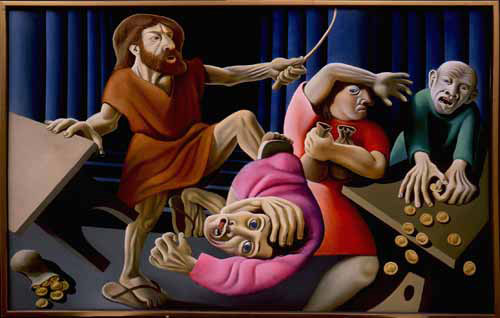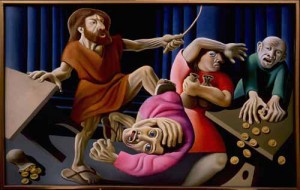For the poor you will always have with you, and you can show kindness to them whenever you wish:
but you will not always have me. (Mark 14:7)
From crude realism to hopeless resignation, this quote from Jesus is confusing at best and disheartening at worst.
What? So poverty and inequality are just a fact of life? Things really aren’t going to change? In Kingdom of God is really so ineffectual?
But Nicholas Perrin has helped me see a different perspective on this saying that revolutionized how I read it and how we should see the vocation of the church (in his excellent Jesus the Temple).
Counter-Temple Movement
Perrin understands Jesus and his movement as a “counter-temple movement”, and by counter-temple he doesn’t mean against the temple all together, but against the current sinful administration of the temple. Jesus is against the temple as it is because it isn’t participating in and pointing toward the true eschatological temple to come (Ez. 37:26-27). Jesus was seeking to establish a true and living temple centered on himself and his movement outside the jurisdiction of the current temple establishment (just think of the temple sayings and activities of Jesus and the temple imagery applied to the early church… I’ll post on this more latter).
In light of this, part of what it would mean to establish the true temple would be to instituted the jubilee practice of forgiving debts (Deut. 15:7-15; Lev. 25), an action that was supposed to be regulated by the priests through the temple treasury, which rarely, if ever, happened.
Jesus and his movement, through living with and as the poor, and as those who attempted to be a clearinghouse for the redistribution of wealth, was in fact functioning like the temple as it was supposed to.
“The Poor You Will Always Have With You”
So when Jesus says, “The poor you will always have with you” he isn’t making a broad social observation about the current and future state of the world, certainly not one based in crude realism (as if he were saying, “There just is and always will be poverty in the world.”) Rather, he is naming part of the inherent calling and purpose of his movement: “You will always have the poor with you because you will be the place that poverty is being overcome through the alternative economy of grace as the new temple”.
Jesus is really naming a vocation for the church, not a reality in the world.
The church will have the poor because part of being the church is being with the poor. If the church is not with and among the poor it is in danger of encountering the prophetic critique of Jesus himself through his Spirit, the same critiques he directed toward the temple establishment of his time.
The Work is With
This could mean all sorts of things for a local congregation: working in homeless shelters, educational programs, debt relief, or other practices of living an alternative, Kingdom-economy.
But we must remember this vocation is not just for the poor, it is with the poor. This is not a vocation from a distance, but a work that is with the people.
Is your local church with the poor in some tangible way that makes sense in your community? If not, then perhaps you are not being built into the temple of God’s dwelling, a place in which God dwells among the fatherless and the widow, the downtrodden and the poor.


